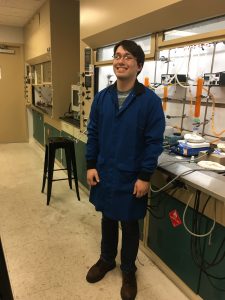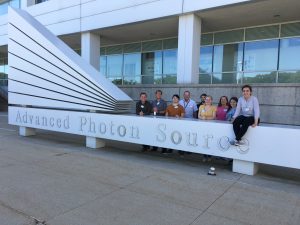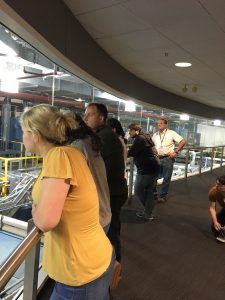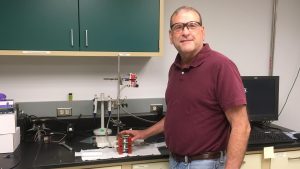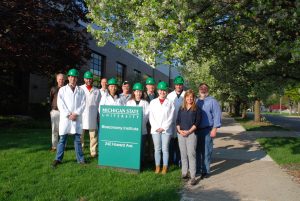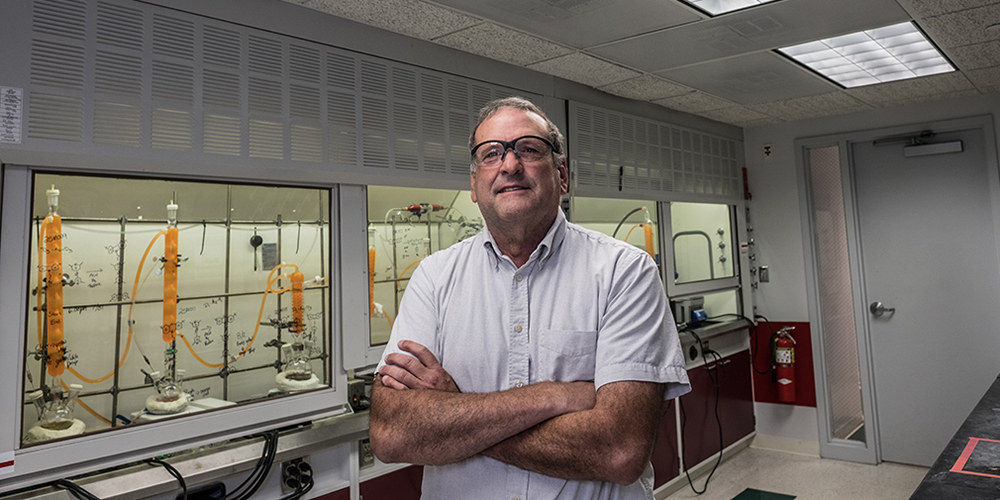Posted on April 18, 2018 by Melanie Kauffman
Future alternative energy success is highly dependent on the ability to store that energy once captured. Tom Guarr, co-founder of Jolt Energy Storage Technologies LLC, and researcher at the MSU Bioeconomy Institute in Holland, Michigan, is pioneering new technology for that purpose.
After applying for a new program sponsored by the U.S. Department of Energy last year, Guarr was notified in March 2018 that he has been selected through a national competition process to participate in the “Chain Reaction Innovations Program” at Argonne National Laboratory. This program will allow him to further extend his battery storage research and bring his licensed MSU technology to market.
Watch a quick video about Tom’s lab.
Recognizing that bringing important breakthroughs into the marketplace includes overcoming many technical and financial hurdles, the U.S. Department of Energy Advanced Manufacturing Office of Energy Efficiency and Renewable Energy (EERE), and Argonne National Laboratory (ANL) recently launched “Chain Reaction Innovations” (CRI) to help innovators obtain and refine the entrepreneurship skills needed to develop and commercialize advances in cleantech and manufacturing.
The Oak Ridge Institute for Science and Education (ORISE) will administer this program for EERE.
Guarr stated, “I’m looking forward to continuing my research at Argonne and bringing back new capabilities and research opportunities to MSU.” He begins his work at Argonne this month.
The competition began in 2017, when the field of 83 applicants from entrepreneurs across the country was narrowed to 21 semifinalists through a process that included a technical evaluation and phone interview. The semifinalists then participated in a “Shark Tank” type of competition at ANL in January 2018, where the top 10 candidates where chosen for another round of competition.
Jolt Energy Storage Technologies, LLC, led by Guarr along with partner Jack Johnson, has licensed several pieces of intellectual property from MSU that relate to the use of organic compounds in batteries. The relevant technology was developed in the Organic Energy Storage Laboratory at the MSU Bioeconomy Institute.
The licensed technology focuses on additives to improve the safety and efficiency of lithium ion batteries (so a cell phone won’t overheat for instance). It offers the possibility of extending the same chemistry to make organic batteries that are inexpensive, efficient, and environmentally friendly. These devices are termed “redox flow batteries” and are aimed at large-scale energy storage applications. Because energy from renewable sources like wind and solar tends to be intermittent, reliable energy storage at the grid level is critically needed in order to provide smooth power output as an increasing amount of energy from such sources is brought online. With technology licensed from MSU, Jolt is developing storage systems that are safe, reliable, and inexpensive enough to make the overall economics attractive.
Lakeshore Advantage, a local non-profit economic development organization, has supported Jolt since their earliest stages of development. The organization assisted Jolt in securing funds through a Business Accelerator Fund grant, a resource available through the Holland SmartZone, to test their solution that improves safety, cost and performance in lithium ion batteries.
“Jolt’s success is a testament to their leadership, collaboration and thoughtful approach to solving an advanced energy storage problem and disrupting the industry along the way,” said Angela Huesman, Chief Operating Officer at Lakeshore Advantage, “We look forward to what’s next for this first MSU Bioeconomy spinout through the Argonne National Labs opportunity, with expectations that this experience will catapult Jolt to its next milestone.”
Read the full press release from Argonne National Lab.


